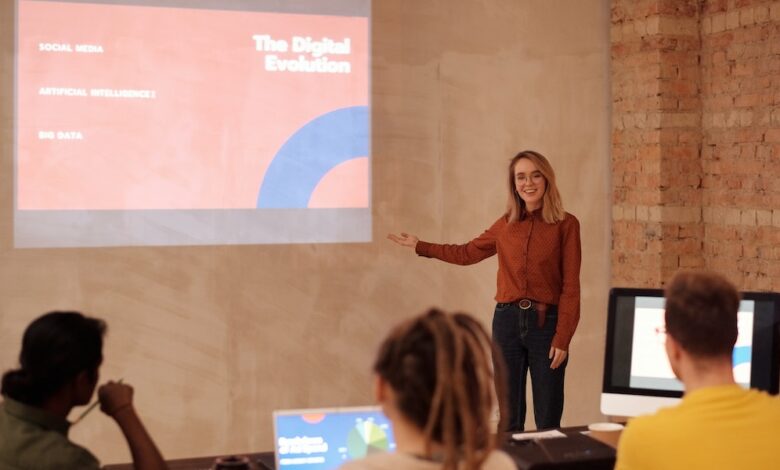7 Best benefits of project-based learning in EdTech

Project-based learning (PBL) has emerged as a powerful educational approach that combines hands-on experiences, critical thinking, and real-world application to enhance student’s learning journey. In the realm of educational technology (EdTech), project-based learning offers a myriad of benefits that go beyond traditional teaching methods. By engaging students actively in the learning process and encouraging collaboration, PBL in EdTech revolutionizes the way knowledge is acquired and applied. In this article, we will explore the seven best benefits of project-based learning in EdTech, highlighting how it enriches students’ educational experiences and equips them with essential skills for the future.
Read More: Top 10 Language Learning Videos You Must Watch
Introduction to project-based learning (PBL) in EdTech
Project-based learning, also known as inquiry-based learning, is an educational approach that centers around student-driven projects. It involves students investigating and responding to real-world challenges, exploring complex problems, and creating meaningful solutions. PBL in EdTech utilizes technology tools and platforms to facilitate interactive and immersive learning experiences, transforming traditional classrooms into vibrant hubs of exploration and discovery.
Benefit 1: Active engagement and hands-on learning
One of the key advantages of project-based learning in EdTech is the active engagement it fosters among students. Unlike passive learning methods, such as lectures or textbook reading, PBL encourages students to actively participate in their own education. Through hands-on activities, interactive simulations, and multimedia resources, EdTech projects provide students with tangible experiences that make learning more exciting and memorable. Whether it’s designing a virtual city or conducting virtual science experiments, the hands-on nature of PBL in EdTech promotes deeper understanding and knowledge retention.

Benefit 2: Critical thinking and problem-solving skills
Critical thinking and problem-solving skills are vital for success in today’s rapidly changing world. PBL in EdTech nurtures these essential skills by immersing students in authentic problem-solving scenarios. By tackling complex challenges and brainstorming innovative solutions, students develop their ability to think critically and analytically. Through EdTech projects, students learn to identify problems, evaluate information, make informed decisions, and adapt their strategies as they encounter obstacles. These problem-solving skills are transferable and can be applied in various academic and real-life situations.
Benefit 3: Collaboration and teamwork
Collaboration is a fundamental skill needed in today’s interconnected society. PBL in EdTech provides an ideal platform for students to develop collaboration and teamwork abilities. Through group projects and online collaborations, students learn to communicate effectively, leverage diverse perspectives, and work towards common goals. EdTech tools offer features like virtual classrooms, discussion boards, and collaborative documents, enabling students to collaborate seamlessly regardless of physical distance. These collaborative experiences prepare students for the collaborative nature of future workplaces.
Benefit 4: Real-world application and relevance
One of the remarkable aspects of project-based learning in EdTech is its emphasis on real-world application and relevance. By integrating real-world contexts and challenges into projects, PBL bridges the gap between theoretical knowledge and practical application. EdTech projects can simulate authentic scenarios, enabling students to apply their learning to real-life situations. Whether it’s building a business plan, conducting historical research, or designing sustainable solutions, EdTech projects empower students to connect classroom learning with real-world issues, enhancing their understanding and appreciation of the subject matter.

Benefit 5: Creativity and innovation
Creativity and innovation are essential skills for success in the modern world. PBL in EdTech cultivates these skills by encouraging students to think outside the box, explore diverse perspectives, and develop unique solutions. EdTech projects provide opportunities for students to unleash their creativity through multimedia presentations, video production, coding, and design. By embracing creativity, students not only enhance their problem-solving abilities but also develop an innovative mindset that can be applied in various domains, from arts and humanities to science and technology.
Benefit 6: Enhanced retention and understanding
Project-based learning in EdTech has proven to enhance long-term retention and understanding of concepts. By actively engaging students in the learning process, PBL creates memorable experiences that go beyond rote memorization. The hands-on nature of EdTech projects stimulates multiple senses and neural pathways, facilitating deeper learning and stronger neural connections. When students are actively involved in the creation of their knowledge, they develop a sense of ownership and invest more effort in understanding the subject matter.
Benefit 7: Personalized and self-directed learning
Every student has unique interests, strengths, and learning styles. PBL in EdTech allows for personalized and self-directed learning experiences, catering to individual needs. By offering a range of project options or allowing students to choose their own topics, EdTech projects empower students to explore areas of personal interest. This personalized approach enhances motivation, engagement, and autonomy, fostering a lifelong love for learning. Students become active agents in their education, taking ownership of their learning journey and developing essential skills such as self-regulation, time management, and goal-setting.

Conclusion
Project-based learning in EdTech revolutionizes the educational landscape by harnessing the power of active engagement, critical thinking, collaboration, and real-world application. By incorporating PBL into educational practices, students gain valuable skills that extend beyond the traditional classroom setting. From active hands-on learning to fostering creativity, innovation, and problem-solving abilities, PBL in EdTech prepares students for the challenges of the future. By embracing project-based learning, educators can nurture a generation of lifelong learners equipped with the skills and mindset necessary to thrive in an ever-evolving world.
Read More: 5 Important Role of EdTech in Promoting social-emotional learning
FAQs
Q: What are some tools or platforms that support project-based learning in EdTech?
A: There are several tools and platforms available to support project-based learning in EdTech, such as Google Classroom, Microsoft Teams, Schoology, Seesaw, and Edmodo. These platforms offer features like collaboration tools, assignment management, and multimedia integration, facilitating the implementation of PBL in the digital learning environment.
Q: How can teachers assess student progress in PBL projects?
A: Assessing student progress in PBL projects requires a multifaceted approach. Teachers can use rubrics to evaluate the quality of student work, assess collaboration and teamwork skills, and provide feedback on critical thinking and problem-solving abilities. Additionally, formative assessments, peer evaluations, and presentations can be used to gauge student understanding and growth throughout the project.
Q: Are there any challenges associated with implementing PBL in EdTech?
A: Implementing PBL in EdTech can present challenges such as the need for technological infrastructure, teacher training, and time management. It requires careful planning, instructional design, and ongoing support to ensure effective implementation. Additionally, providing equal access to technology and addressing potential equity issues are important considerations.
Q: Can project-based learning be effective for all subjects and grade levels?
A: Yes, project-based learning can be adapted and implemented across various subjects and grade levels. Whether it’s science, mathematics, language arts, social studies, or even physical education, the principles of PBL can be applied to create meaningful and engaging learning experiences.
Q: How can parents support their children’s project-based learning experiences?
A: Parents can support their children’s project-based learning experiences by encouraging curiosity, asking open-ended questions, providing resources, and engaging in discussions about their projects. They can also collaborate with teachers and offer guidance, fostering a positive learning environment that extends beyond the school setting.












One Comment